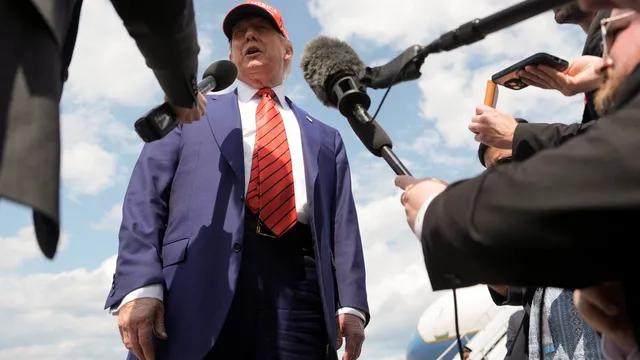
Trump defies intelligence on Iran's nuclear capabilities
2025-06-21 09:43- Trump dismissed the Director of National Intelligence's statement that Iran is not pursuing nuclear weapons.
- Recent military actions from Israel against Iran have further complicated U.S. involvement.
- There are growing concerns that Trump's rhetoric is leading toward a potential war in the Middle East.
Express your sentiment!
Insights
In the recent escalation of tensions between the United States and Iran, President Donald Trump has overridden intelligence community assessments asserting that Iran is not actively seeking nuclear weapons. This clash became evident on Air Force One when Trump dismissed remarks from Tulsi Gabbard, the Director of National Intelligence, stating that Iran's Supreme Leader has not authorized a nuclear weapons program. Despite the opposition from his own administration, Trump has publicly maintained that Iran is very close to developing a nuclear weapon, a claim that conflicts with the analyses provided by his intelligence agencies. On March 26, Gabbard testified to Congress, highlighting the consensus among 18 U.S. intelligence agencies about Iran's nuclear program. She asserted that Iran was not currently working on a nuclear weapon and remarked that Khomeini had suspended any such program back in 2003. Nonetheless, Trump’s dismissal of these assessments raises concerns about the motivations behind his rhetoric and whether he is aiming to build a case for military intervention. Many political analysts view his actions as reflecting a pattern reminiscent of the lead-up to the Iraq War in 2003. As the geopolitical landscape shifts, Trump has aligned more closely with Israel, which has launched strikes against Iranian nuclear facilities. On the recent uptick in military engagements, Israel's Prime Minister, Benjamin Netanyahu, has claimed that Iran is nearing a nuclear weapon and indicated support for military operations to counter this potential threat. Trump’s rhetoric about an “unconditional surrender” for Iran and his mention of precise locations of Iranian leaders illustrate his administration's aggressive stance, counteracting Gabbard's intelligence brief. There are voices within the Senate both supporting and opposing Trump's militaristic approach toward Iran. While many Republican senators back Trump’s decisions, some express caution regarding commencing new hostilities without congressional approval. Meanwhile, Senators Elizabeth Warren and Tim Kaine have introduced resolutions that emphasize the necessity of congressional oversight to prevent unwarranted military actions. The pathways that led to this fraught moment can be traced back to the unraveling of the 2015 nuclear deal with Iran, which Trump rescinded in 2018, leading to increased instability in the region and exacerbating tensions that could result in significant military conflict.
Contexts
The authority of Congress in U.S. military actions has been a subject of robust debate throughout American history. This authority is rooted in the Constitution, which expressly grants Congress the power to declare war. The Founding Fathers were acutely aware of the potential for executive overreach in military matters, so they vested this crucial power in the legislative branch, thereby ensuring that military engagements would reflect the will of the people through their elected representatives. This framework aims to create a system of checks and balances between the legislative and executive branches, thus safeguarding against unilateral military action by the President without legislative consent. However, the interpretation of this authority has evolved, especially in the context of modern warfare and foreign policy considerations. The War Powers Resolution of 1973 was a Congressional response to concerns over presidential power in the realm of military engagement, particularly after the Vietnam War. This resolution seeks to reassert Congressional authority by requiring the President to consult with Congress before committing U.S. forces to armed conflict and mandates a withdrawal of those forces within 60 days unless Congress has declared war or granted an extension. Despite its intention to clarify the balance of power, the effectiveness and adherence to the War Powers Resolution have been questioned. Presidents from various administrations have often cited it as an unconstitutional infringement on their authority as Commander in Chief, resulting in a pattern of military engagements that bypass traditional legislative oversight. Congress's role has increasingly transformed into that of a reactive body rather than a proactive one in military matters. Many argue that the rise of global threats and the immediacy required in modern warfare has led to an environment where swift action is paramount, thus sidelining Congressional input. Additionally, post-9/11, military actions against terrorism have often been conducted under the Authorization for Use of Military Force (AUMF), which has granted the President broad authority to act without explicit Congressional approval. This has sparked debates over the extent to which these authorizations erode Congress's constitutional role in declaring war and has raised questions about the potential for a prolonged state of military engagement with insufficient oversight. The ongoing discourse surrounding Congressional authority in military actions underscores a significant constitutional dilemma. As policymakers continue to navigate complex global environments, the need for a collaborative approach that includes both arms of government becomes increasingly crucial. An effective balance must be struck to ensure quick and decisive action in times of crisis while upholding the democratic principles of accountability and representation. Future discussions should focus on clarifying the roles and responsibilities of Congress and the President in military matters, reinforcing the need for a well-defined framework that respects both the necessity of immediate action and the imperative of legislative oversight.